German film and television actress Uschi Glas (1944) appeared in many light entertainment films in the late 1960s and early 1970s. Later she focused on television work.
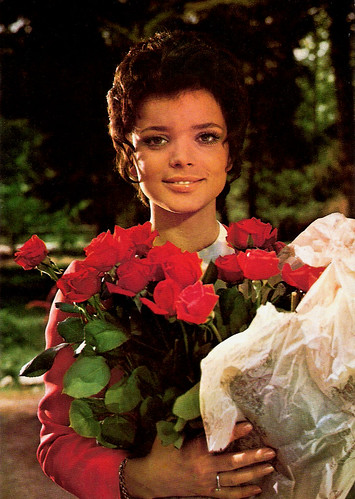
German postcard by Franz Josef Rüdel Filmpostkartenverlag, Hamburg, no. F-47. Photo: Gloria. Publicity still for Hurra, unsere Eltern sind nicht da/Hurrah, Our Parents Aren't There (Wolfgang Schleif, 1970).
Uschi Glas was born as Helga Ursula Glas in Landau, Germany, in 1944. Her father was a car repairman and she had three older sisters. Glas worked in München (Munich) as a secretary and tried to enter the film business.
At a premiere, she made some critical remarks to producer Horst Wendlandt. He was interested in her and gave her her first film role in the Edgar Wallace thriller Der unheimliche Mönch/The Sinister Monk (Harald Reinl, 1965) starring Karin Dor. Glas took some acting classes from Annemarie Hanschke.
Soon she played a leading role in the Karl May Film Winnetou und das Halbblut Apanatschi/Half-Breed (Harald Philipp, 1966) featuring Pierre Brice. Her breakthrough role was that of Barbara in the unconventional comedy Zur Sache, Schätzchen/Go for It, Baby (May Spils, 1968). The film captured the spirit of the times in presenting youth protests against the German establishment and hinted at the loosening of morals in the wake of the sexual revolution.
From then on, the tabloid press would refer to Glas frequently as ‘Schätzchen’. In the late 1960s and early 1970s, Glas appeared in many light entertainment films. She played in three Lümmel films, a slapstick series with films as Die Lümmel von der ersten Bank/The Brats on the Front Bench Row (Werner Jacobs, 1968).
She also co-starred with Schlager singer Roy Black in mediocre fare as Hilfe, ich liebe Zwillinge/Help, I Love Twins (Peter Weck, 1969). She also changed directions politically and became a supporter of the right-wing CSU party.
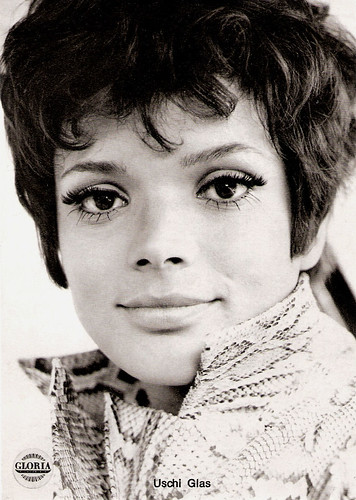
German postcard by Franz Josef Rüdel Filmpostkartenverlag, Hamburg, no. 5130. Photo: Gloria. Publicity still for Hilfe, ich liebe Zwillinge/Help, I Love Twins (1969, Peter Weck).
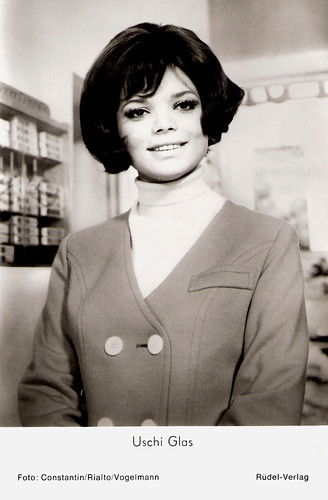
German postcard by Franz Josef Rüdel Filmpostkartenverlag, Hamburg, no. 5014. Photo: Constantin / Rialto / Vogelmann. Publicity still for Klassenkeile/Spanking at School (Franz Josef Gottlieb, 1969).
In 1969 Uschi Glas made her stage debut with the play 'Unsere liebste Freundin' (Our Best Friend) in Düsseldorf. In the early 1970s, German entertainment films became less and less popular, and Glas tried to find success outside Germany.
In France, she appeared in Le Tueur/Killer (Denys de La Patellière, 1972) starring Jean Gabin and in Italy in the Giallo Sette orchidee macchiate di rosso/Seven Blood Stained Orchids (Umberto Lenzi, 1972) with Antonio Sabato.
Robert Firsching at AllMovie about the latter: “This uneven thriller directed by Umberto Lenzi was the final Rialto Film Company adaptation of an Edgar Wallace mystery (The Puzzle of the Silver Half-Moons), as tastes were changing and the German ‘Krimi’ genre was dying in favour of the sexier, bloodier Italian ‘Giallo.’ In this awkward German-Italian co-production, Lenzi straddles the two genres with confused results.”
From then on, Glas worked more and more for television. She guest-starred in the popular Krimi series Der Kommissar/The Commissionaire (1973) with Erik Ode and Fritz Wepper and Derrick (1976).
Then Uschi Glas became one of the leads of the police series Polizeiinspektion 1/Police Inspection 1 (1977-1988).
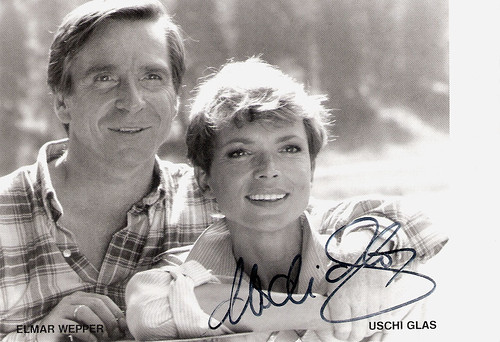
German card.
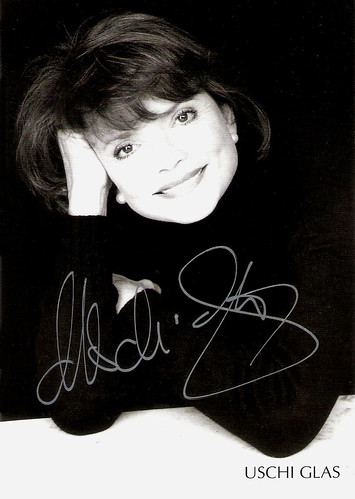
German card by Simon Offset, München. Photo: Christian Rieger.
In the 1980s and 1990s, Uschi Glas concentrated on her television work. She appeared in a succession of TV series tailored to her person. In the popular series Unsere schönsten Jahre/Our Best Years (1983) and Zwei Münchner in Hamburg/Two People from Munich in Hamburg (1989) her partner was Elmar Wepper. She played a veterinarian in Tierärztin Christine/Veterinarian Christine (Otto Retzer, 1993), an energetic businesswoman in Anna Maria – Eine Frau geht ihren Weg/Anna Maria – A Woman Does it Her Way (Celino Bleiweiss, 1994), and the ideal teacher in Sylvia – Eine Klasse für sich/Sylvia – A Class of her Own (Erwin Keusch, Heidi Kranz, 1998).
She also appeared in many feature-length made-for-TV films. In total, Glas appeared in more than 75 film and TV productions. Glas was married to the actor Bernhard Tewaag from 1981 until their divorce in 2003. They have three children, actor Ben Tewaag, actress Julia Tewaag, and lawyer Alex Tewaag. In 1998 Glas was honoured with the Bundesverdienstkreuz (Germany's Cross of Merit).
In 2002, she released the music album 'Uschi Glas singt die schönsten Weihnachtslieder', followed by the CD 'Sonne, Mond und Sterne - Uschi Glas singt die schönsten deutschen Lieder' in 2003. In 2003 she appeared in underwear for the German edition of Maxim. The public reaction was devastating. A year she caused another stir when the consumer organisation ‘Stiftung Warentest’ revealed that her skincare crème caused a rash. Many comedians made their jokes about the ‘affair’ for months.
In 2004, Glas also published the memoir 'Mit einem Lächeln' (With a Smile). A year later she married management consultant Dieter Herrmann. In 2016, she published the book 'Herzenssache. Vom Glück, gebraucht zu werden' (A matter of the heart. The happiness of being needed). In the most successful German films of 2013, 2015 and 2017, the comedies Fack ju Göthe/Suck Me Shakespeer (Bora Dağtekin, 2013), Fack ju Göhte 2 (Bora Dağtekin, 2015) and Fack ju Göthe 3 (Bora Dağtekin, 2017) starring Elyas M'Barek and Karoline Herfurth, Glas was seen in a supporting role as a burnt-out, suicidal teacher. This meant that she appeared in ten of the 100 most successful German cinema films between 1966 and 2017.
In the TV film Club der einsamen Herzen/Club Of The Lonely Hearts (Christine Hartmann, 2018), Uschi Glas played one of three childhood friends alongside Hannelore Elsner and Jutta Speidel who have not spoken for several years and want to meet up again and open a dance café. She also appeared in the family film Max und die wilde 7/Max and the Wild 7 (Winfried Oelsner, 2020) and the sequel Max und die Wilde 7: Die Geister-Oma/Max and the Wild 7: The Ghost Granny (Winfried Oelsner, 2024). In 2024, Glas also took part in the tenth season of the TV show The Masked Singer in costume as ‘Tapsi, the baby lion’ and came seventh.

German postcard by MSK. Photo: Zill. Publicity still for Die Tote aus der Themse/Angels of Terror (Harald Philipp, 1971).
Sources: Robert Firsching (AllMovie - page now defunct), Wikipedia (German and English), and IMDb.
This post was last updated on 1 June 2024.

German postcard by Franz Josef Rüdel Filmpostkartenverlag, Hamburg, no. F-47. Photo: Gloria. Publicity still for Hurra, unsere Eltern sind nicht da/Hurrah, Our Parents Aren't There (Wolfgang Schleif, 1970).
In the wake of the Sexual Revolution
Uschi Glas was born as Helga Ursula Glas in Landau, Germany, in 1944. Her father was a car repairman and she had three older sisters. Glas worked in München (Munich) as a secretary and tried to enter the film business.
At a premiere, she made some critical remarks to producer Horst Wendlandt. He was interested in her and gave her her first film role in the Edgar Wallace thriller Der unheimliche Mönch/The Sinister Monk (Harald Reinl, 1965) starring Karin Dor. Glas took some acting classes from Annemarie Hanschke.
Soon she played a leading role in the Karl May Film Winnetou und das Halbblut Apanatschi/Half-Breed (Harald Philipp, 1966) featuring Pierre Brice. Her breakthrough role was that of Barbara in the unconventional comedy Zur Sache, Schätzchen/Go for It, Baby (May Spils, 1968). The film captured the spirit of the times in presenting youth protests against the German establishment and hinted at the loosening of morals in the wake of the sexual revolution.
From then on, the tabloid press would refer to Glas frequently as ‘Schätzchen’. In the late 1960s and early 1970s, Glas appeared in many light entertainment films. She played in three Lümmel films, a slapstick series with films as Die Lümmel von der ersten Bank/The Brats on the Front Bench Row (Werner Jacobs, 1968).
She also co-starred with Schlager singer Roy Black in mediocre fare as Hilfe, ich liebe Zwillinge/Help, I Love Twins (Peter Weck, 1969). She also changed directions politically and became a supporter of the right-wing CSU party.

German postcard by Franz Josef Rüdel Filmpostkartenverlag, Hamburg, no. 5130. Photo: Gloria. Publicity still for Hilfe, ich liebe Zwillinge/Help, I Love Twins (1969, Peter Weck).

German postcard by Franz Josef Rüdel Filmpostkartenverlag, Hamburg, no. 5014. Photo: Constantin / Rialto / Vogelmann. Publicity still for Klassenkeile/Spanking at School (Franz Josef Gottlieb, 1969).
The death of the Edgar Wallace films
In 1969 Uschi Glas made her stage debut with the play 'Unsere liebste Freundin' (Our Best Friend) in Düsseldorf. In the early 1970s, German entertainment films became less and less popular, and Glas tried to find success outside Germany.
In France, she appeared in Le Tueur/Killer (Denys de La Patellière, 1972) starring Jean Gabin and in Italy in the Giallo Sette orchidee macchiate di rosso/Seven Blood Stained Orchids (Umberto Lenzi, 1972) with Antonio Sabato.
Robert Firsching at AllMovie about the latter: “This uneven thriller directed by Umberto Lenzi was the final Rialto Film Company adaptation of an Edgar Wallace mystery (The Puzzle of the Silver Half-Moons), as tastes were changing and the German ‘Krimi’ genre was dying in favour of the sexier, bloodier Italian ‘Giallo.’ In this awkward German-Italian co-production, Lenzi straddles the two genres with confused results.”
From then on, Glas worked more and more for television. She guest-starred in the popular Krimi series Der Kommissar/The Commissionaire (1973) with Erik Ode and Fritz Wepper and Derrick (1976).
Then Uschi Glas became one of the leads of the police series Polizeiinspektion 1/Police Inspection 1 (1977-1988).

German card.

German card by Simon Offset, München. Photo: Christian Rieger.
In underwear for Maxim
In the 1980s and 1990s, Uschi Glas concentrated on her television work. She appeared in a succession of TV series tailored to her person. In the popular series Unsere schönsten Jahre/Our Best Years (1983) and Zwei Münchner in Hamburg/Two People from Munich in Hamburg (1989) her partner was Elmar Wepper. She played a veterinarian in Tierärztin Christine/Veterinarian Christine (Otto Retzer, 1993), an energetic businesswoman in Anna Maria – Eine Frau geht ihren Weg/Anna Maria – A Woman Does it Her Way (Celino Bleiweiss, 1994), and the ideal teacher in Sylvia – Eine Klasse für sich/Sylvia – A Class of her Own (Erwin Keusch, Heidi Kranz, 1998).
She also appeared in many feature-length made-for-TV films. In total, Glas appeared in more than 75 film and TV productions. Glas was married to the actor Bernhard Tewaag from 1981 until their divorce in 2003. They have three children, actor Ben Tewaag, actress Julia Tewaag, and lawyer Alex Tewaag. In 1998 Glas was honoured with the Bundesverdienstkreuz (Germany's Cross of Merit).
In 2002, she released the music album 'Uschi Glas singt die schönsten Weihnachtslieder', followed by the CD 'Sonne, Mond und Sterne - Uschi Glas singt die schönsten deutschen Lieder' in 2003. In 2003 she appeared in underwear for the German edition of Maxim. The public reaction was devastating. A year she caused another stir when the consumer organisation ‘Stiftung Warentest’ revealed that her skincare crème caused a rash. Many comedians made their jokes about the ‘affair’ for months.
In 2004, Glas also published the memoir 'Mit einem Lächeln' (With a Smile). A year later she married management consultant Dieter Herrmann. In 2016, she published the book 'Herzenssache. Vom Glück, gebraucht zu werden' (A matter of the heart. The happiness of being needed). In the most successful German films of 2013, 2015 and 2017, the comedies Fack ju Göthe/Suck Me Shakespeer (Bora Dağtekin, 2013), Fack ju Göhte 2 (Bora Dağtekin, 2015) and Fack ju Göthe 3 (Bora Dağtekin, 2017) starring Elyas M'Barek and Karoline Herfurth, Glas was seen in a supporting role as a burnt-out, suicidal teacher. This meant that she appeared in ten of the 100 most successful German cinema films between 1966 and 2017.
In the TV film Club der einsamen Herzen/Club Of The Lonely Hearts (Christine Hartmann, 2018), Uschi Glas played one of three childhood friends alongside Hannelore Elsner and Jutta Speidel who have not spoken for several years and want to meet up again and open a dance café. She also appeared in the family film Max und die wilde 7/Max and the Wild 7 (Winfried Oelsner, 2020) and the sequel Max und die Wilde 7: Die Geister-Oma/Max and the Wild 7: The Ghost Granny (Winfried Oelsner, 2024). In 2024, Glas also took part in the tenth season of the TV show The Masked Singer in costume as ‘Tapsi, the baby lion’ and came seventh.

German postcard by MSK. Photo: Zill. Publicity still for Die Tote aus der Themse/Angels of Terror (Harald Philipp, 1971).
Sources: Robert Firsching (AllMovie - page now defunct), Wikipedia (German and English), and IMDb.
This post was last updated on 1 June 2024.
No comments:
Post a Comment